ALPENA, MICH.: The Great Lake State is home to, well, a lot of lakes. In addition to the hiking, fishing, and beaches that residents and tourists love, the city of Alpena in the Northeast offers entertainment at Thunder Bay Theatre. American Theatre caught up with producing artistic director Jeffrey Mindock via email to learn more about the region and producing theatre there. “Thunder Bay Theatre shares a street with the Thunder Bay National Marine Sanctuary, the world’s only freshwater marine sanctuary in the world,” says Mindock of the area. “Major League Fishing has visited Alpena three times, which is apparently a record!”
Who founded the Thunder Bay Theatre, when, and why?
Thunder Bay Theatre was founded in 1967 by Keith Titus, a professor at Alpena Community College, to supplement a lack of summer programming at Alpena Civic Theatre. At the time, running the community theatre was a requirement to teach theatre at Alpena Community College. Thunder Bay Theatre moved into its current location and was run by Titus, his wife, and another married couple, presenting year-round programming starting in 1983.
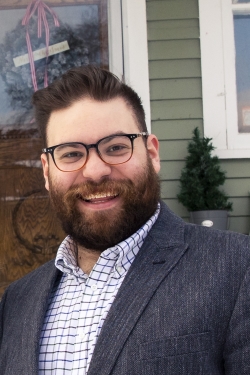
Tell us about yourself and your connection to the company.
I have been Thunder Bay Theatre’s producing artistic director for five years. My wife Paige and I run the theatre as producing artistic director and associate artistic director, while continuing to grow and augment our administrative and production staff. I graduated from DeSales University in Center Valley, Pa., in 2012.
For three years after college I enjoyed a career as a non-Equity performer primarily performing musical theatre and Shakespeare in Pennsylvania, New York, Illinois, Kentucky, North Carolina, West Virginia, and finally, Michigan. Paige and I met at Festival 56 in Princeton, Ill., in 2013 during a summer stock where I played Macbeth, Long John Silver, Ruben in Joseph and the Technicolor Dreamcoat, and Dave in The Fully Monty. Paige stage managed Joseph, and had the privilege of peeling the sweaty Saran wrap from my body every night during The Fully Monty as a production assistant. It was love from that moment forward. The following fall I was part of Thunder Bay Theatre’s Core Company performing in Grey Gardens, Boeing-Boeing, and Disney’s Beauty and the Beast.
During my exit interview I informed the board of directors that I loved Alpena and the theatre, but I would only return if I was running the place (with youthful bright-eyed optimism). Three months later, after a five-year plan conceived by Paige and I, the board of directors offered us our first contract for summer 2014. I cast and hired my first full season at Thunder Bay Theatre via Actors Access and personal contacts while touring North Carolina with NC Shakes’s productions of Hamlet and The Comedy of Errors. The rest is history, and we’ve learned a lot in the process.
What sets your theatre apart from others in your region?
Thunder Bay Theatre is the only year-round professional theatre company in Northeast Michigan, and the only professional theatre company period for 120 miles across the state to Parallel 45 in Traverse City, and 108 miles down to Flint Rep in Flint, Mich. Thunder Bay Theatre is most unique in our focus on the growth and development of young professionals, which in turn benefits our community’s growth and understanding in the world as it relates to our community on a local, statewide, and national level. Thunder Bay Theatre was once home to Alexandra Silber (Fiddler on Broadway), Zach Erhardt (Book of Mormon, Broadway National Tour), and Cameron Jones (The Lion King on Broadway). With this in mind, Thunder Bay Theatre’s focus is on community impact and engagement through telling familiar and unfamiliar stories through high-quality and consistent theatre arts. Thunder Bay Theatre strives to be a safe and inclusive place for its professionals to create art that drives them forward, while driving our community forward through its content. The development of Thunder Bay Theatre’s educational programs, specifically the organization’s educational tour, has served more than 35,000 students in three years.
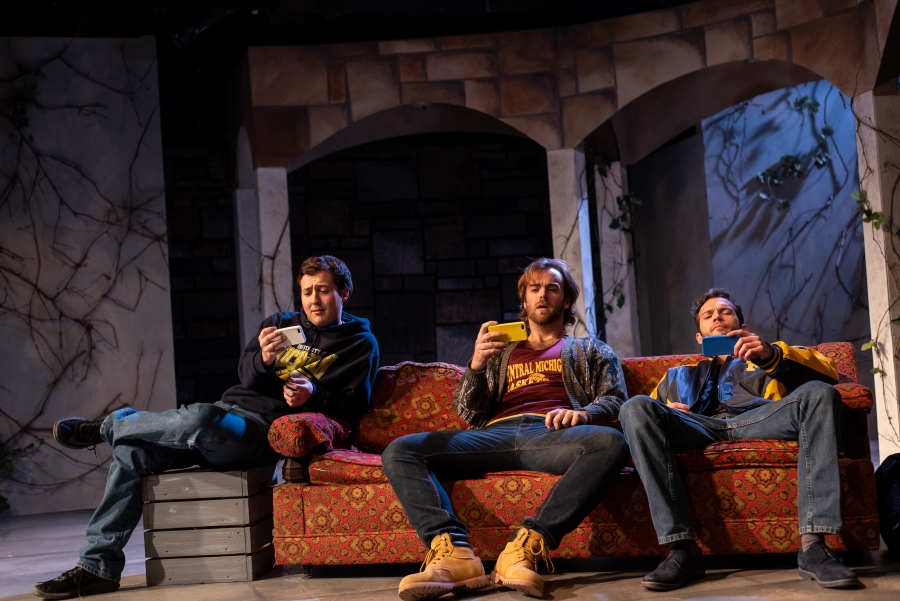
Tell us about your favorite theatre institution other than your own, and why you admire it.
Growing up on the East Coast in the middle of New York City and Philadelphia, I had the privilege of access to Broadway, Equity theatres, professional non-Equity theatres, educational theatres, and community theatres. Although I have several institutions that provided seminal moments in my life, I need to highlight the work being done at the Pennsylvania Shakespeare Festival, whose home is at my alma mater, DeSales University. The work they continue to do with Shakespeare is unparalleled, but the way that they continue to improve their intern program is what I admire most. The program has grown greatly since my time at the festival to include more hands-on training with the professional Equity members that spend their summers in Center Valley. The educational opportunities provided by the festival during the summer, in addition to the work they continue to do with their Linny Fowler WillPower Educational Tour, has had a direct impact on my artistic directorship.
How do you pick the plays you put on your stage?
Thunder Bay Theatre enlists a programming committee that I meet with a few times a year to make proposals, which are then reviewed before going to the board of directors. 2018 was the first time in five years that we chose an annual programming calendar at one time since 2013. We strive to find a perfect blend of shows that will interest both entire our season and year-long residents, while also finding shows that will challenge our audiences in unexpected ways. Thunder Bay Theatre produces work each year that includes TYA shows, an educational tour, musicals, dramas, comedies, and Shakespeare, all with an eye toward our educational commitment.
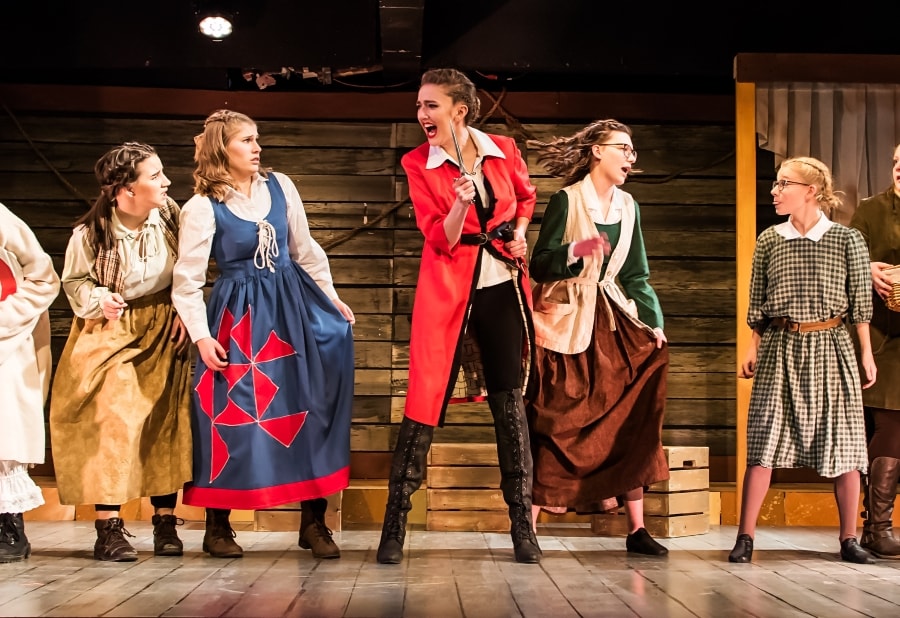
Does your theatre offer any education and/or community engagement programming?
Our theatre’s focus is on education and community engagement. In 2017 the organization established TBT2 to encompass all of our educational offerings. Those include an annual youth production performed by ages 10-21, the annual educational tour, summer camps, vocal lessons, dance lessons, and more programming to come. The theatre has a special relationship with the local high school, serving as advisors to the Alpena High School Masquers club. Professionals from the theatre teach all workshops, direct all productions, and each holiday season the club is invited to perform their annual high school musical at Thunder Bay Theatre for three weeks. The play is produced collaboratively, and the community supports the venture in droves. In 2018 Thunder Bay Theatre established teaching relationships with the Boys and Girls Club of Alpena, thanks to a grant through the Michigan Council for Arts and Cultural Affairs and All Saints Catholic School in Alpena, where I teach theatre curriculum for grades K-6 every Monday of the school year.
Also, Thunder Bay Theatre is embarking on an exciting the Social Injustice project in 2019 with the Central Michigan University’s theatre department. Students and advisors from the Thunder Bay Theatre, the Alpena High School Masquers, and CMU will work collaboratively, via technology, on producing plays that deal with social injustice issues of today. The first play will be Clybourne Park, while the students study A Raisin in the Sun simultaneously. This project is being led by CMU associate professor Dr. Annette Thornton and Thunder Bay Theatre’s leadership.
What’s your annual budget, and how many artists do you employ each season?
In 2014 Thunder Bay Theatre’s annual budget was $140,000, and in 2019 we have a projected budget of $225,000. Each year we employ around 10 year-long artists and about 50 artists in total.
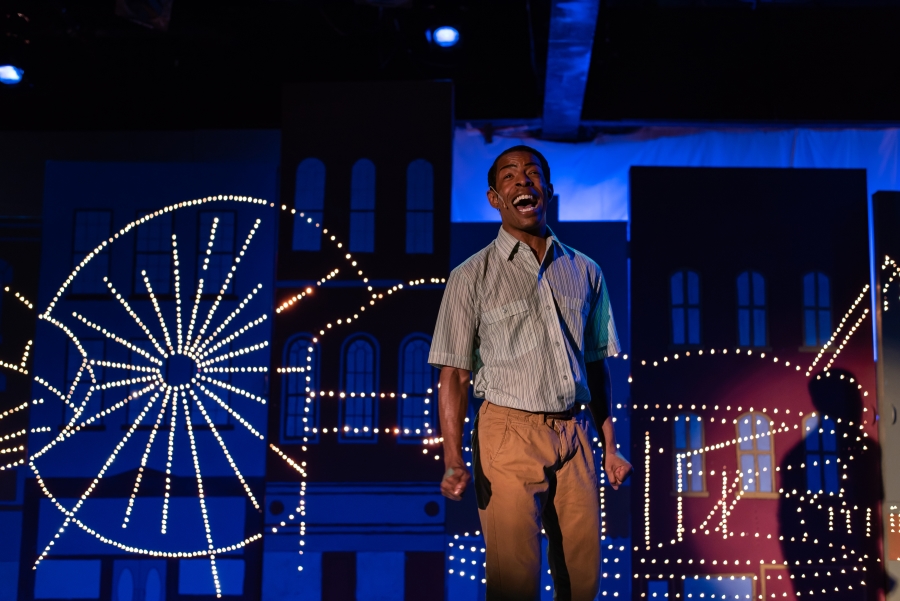
What show are you working on now? Anything else in your season that you’re especially looking forward to?
We are in the final week of performances for Peter Pan, which is the collaborative production between the AHS Masquers and Thunder Bay Theatre. This production had a special twist, with managing director and AHS graduate Molly Stricker directing the play—and I’m playing Captain Hook alongside two more professional actors and 20 high school and middle school students in the play. For 2019 we’re very excited about producing Into the Woods, which will be the first Sondheim Thunder Bay Theatre has done during our tenure. Next year’s jukebox musical will be The Marvelous Wonderettes: Caps and Gowns, just two years after producing the original title, which was widely loved by our community.
Strangest or funniest thing you’ve ever seen (or put) on your stage?
Our production of The Drowsy Chaperone was magical and hit all the right moments. Our Man in Chair, Aidan Cleary, was simply mesmerizing and had the audience eating out of the palm of his hand every night. One night he left the stage to share his snack with an audience member while the rest of the cast was stuck in a freeze frame and I’ll never forget it. It’s the production that everyone still refers to as “that one play.” Due to our budget constraints, we have to use quite a lot of theatre magic and imagination to accomplish the types of things that bigger theatres with larger stages and more resources can produce.
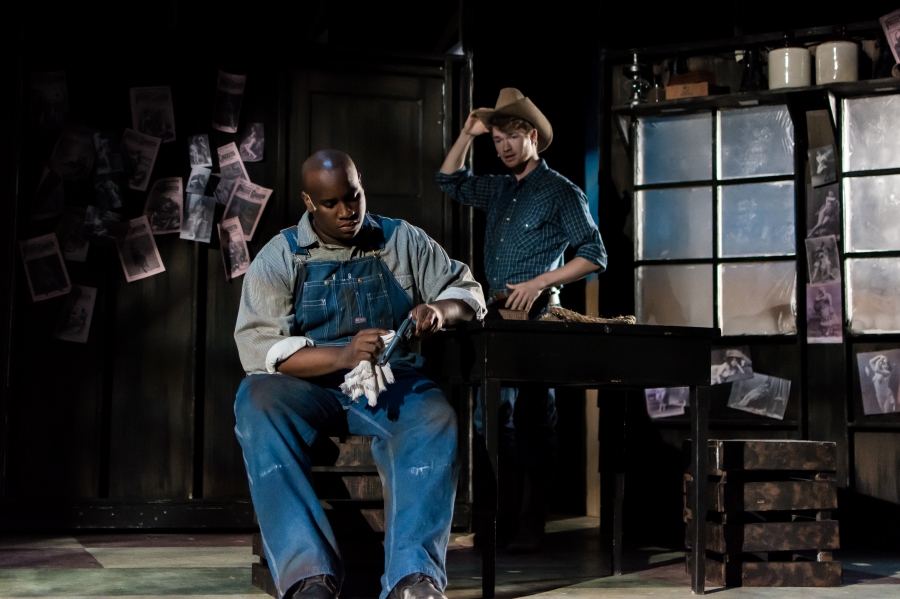
What are you doing when you’re not doing theatre?
In addition to serving as the producing artistic director, I am responsible for Christian Education at First Congregational UCC Alpena, substitute teach at the local schools, and serve as a DDA board member. I love video games and sports. My Philadelphia sports fandom still looms large, as was especially evidenced when the Philadelphia Eagles won the Super Bowl. They didn’t grease the light poles in Alpena, Mich., like in Philly, but they should have.
What does theatre—not just your theatre, but the American or world theatre—look like in, say, 20 years?
In 20 years, I hope that the theatre is more diverse, inclusive, and collaborative. Equal representation from top to bottom is imperative to continue to tell authentic, relatable stories for our communities. Some people disagree with me when I say this, but I firmly believe that our purpose is to produce work for our audience. I don’t believe in pandering to our audience, and I am most fulfilled when we are able to challenge our audience and they come back wanting more. But I want theatre that engages our audience, that lets them know that they are an important part of the work.
The only way to continue to grow the theatre is to instill the importance of theatre and inspire more artists. I hope our society continues to discover and understand the universality of art and theatremaking. Being an artist doesn’t just mean you wake up every morning and clock in at a theatre. Being an artist means that individuals are equipped to use tools like empathy, compassion, and creativity to solve problems. Artists’ ability to use these tools, especially in the theatre, is what makes collaboration so fulfilling. Through collaboration we find better ideas and better versions of ourselves, which is what I hope the theatre continues to discover in itself.


